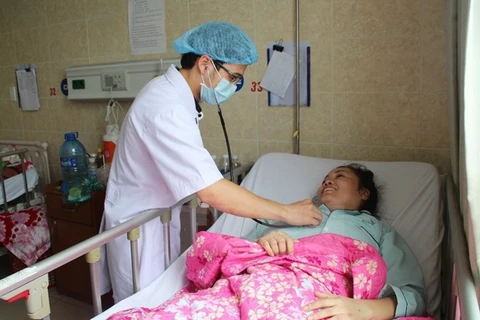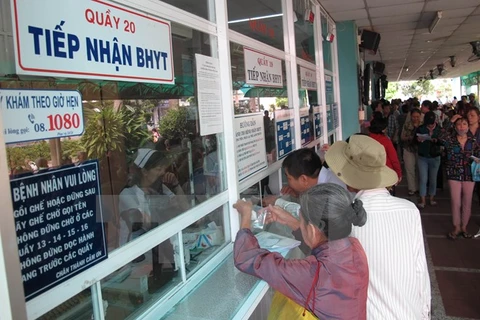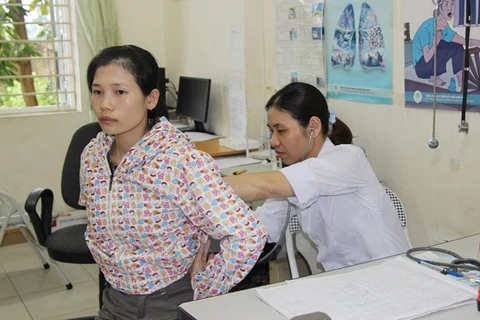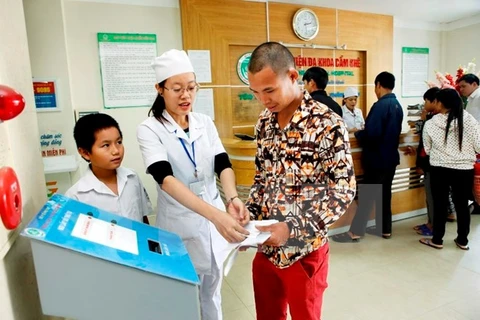Hanoi (VNA) - Private hospitals that have signed health-insurance contracts with the Vietnam Social Security (VSS) will continue the contracts next year. However, private healthcare facilities must now have their classifications authorised by the Ministry of Health.
Le Van Phuc, deputy director of VSI’s Department for Health Insurance Policy said that VSS did not order provincial social insurance agencies to end their existing healthcare contracts with private healthcare facilities.
The agency requested private healthcare facilities to add health ministry decisions on the levels of service and technical classifications of their facilities. He said this information would serve as a foundation to identify health-insurance payment levels according to the Health Insurance Law.
The levels of service provided will also determine the technical services provided, use of medicines and patient transfers to hospitals in other class.
However, the Ministry of Health has not issued any instructions about the levels of hospital classification for private healthcare facilities. This has caused difficulties for social insurance agencies and private hospitals in identifying health insurance prices. This means that hospitals of the same size but in different provinces are experiencing different health insurance payments.
Phuc said the Ministry of Health needs to issue the instructions or at least temporary criteria for classifications to solve the problem.
There are currently three levels of hospital classification for public hospitals based on groups of criteria set by the ministry.
The VSS has also ordered provincial social insurance agencies to work with local health departments to compile and publicise a list of healthcare facilities that linked healthcare with health insurance. The VSS will soon review contracts on healthcare facilities that have these facilities.
The VSS said it would not sign contracts with healthcare facilities that were reported by authorised State agencies to have misused and abused health insurance funds.
It asked local insurance agencies to strictly assess hospitals and healthcare facilities that register for next year.
People making fake social insurance-related documents to trick others and illegally enjoy social insurance policies by appropriating 10-100 million VND (440-4,400 USD) will be fined 20-200 million VND (880-8,800 USD) or imprisoned from three months to two years.
It is one of the regulations in the Penal Code No. 100/2015/QH13, which will come into effect from the beginning of next year. The regulations were announced by the VSS at a press meeting on December 6.
People will be fined 100-200 million VND, or sentenced to a prison term of 1-5 years if they have organised rings to appropriate 100-500 million VND from the social insurance fund or caused losses worth 200-500 million VND.
They will be sentenced to 5-10 years’ imprisonment if they have appropriated more than 500 million VND.
Owner of enterprises that refuse or use trickery to avoid paying social insurance and health insurance for workers will be fined 50-200 million VND or sentenced to prison for three months to one year depending of the level of violation.
If they repeat the violations more than twice or try to avoid paying social insurance by 1 billion VND they will be fined 200-500 million VND or sentenced to six months to three years’ imprisonment.
They will be sentenced to a prison term of 2-7 years if they avoid paying social insurance by more than 1 billion VND (44,000 USD).
By the end of October this year, the total social insurance, health insurance and unemployment insurance debt was 16.6 trillion VND (730.6 million USD), a decrease of 64 billion VND (2.8 million USD) compared with the previous month, according to the VSS.-VNA
Le Van Phuc, deputy director of VSI’s Department for Health Insurance Policy said that VSS did not order provincial social insurance agencies to end their existing healthcare contracts with private healthcare facilities.
The agency requested private healthcare facilities to add health ministry decisions on the levels of service and technical classifications of their facilities. He said this information would serve as a foundation to identify health-insurance payment levels according to the Health Insurance Law.
The levels of service provided will also determine the technical services provided, use of medicines and patient transfers to hospitals in other class.
However, the Ministry of Health has not issued any instructions about the levels of hospital classification for private healthcare facilities. This has caused difficulties for social insurance agencies and private hospitals in identifying health insurance prices. This means that hospitals of the same size but in different provinces are experiencing different health insurance payments.
Phuc said the Ministry of Health needs to issue the instructions or at least temporary criteria for classifications to solve the problem.
There are currently three levels of hospital classification for public hospitals based on groups of criteria set by the ministry.
The VSS has also ordered provincial social insurance agencies to work with local health departments to compile and publicise a list of healthcare facilities that linked healthcare with health insurance. The VSS will soon review contracts on healthcare facilities that have these facilities.
The VSS said it would not sign contracts with healthcare facilities that were reported by authorised State agencies to have misused and abused health insurance funds.
It asked local insurance agencies to strictly assess hospitals and healthcare facilities that register for next year.
People making fake social insurance-related documents to trick others and illegally enjoy social insurance policies by appropriating 10-100 million VND (440-4,400 USD) will be fined 20-200 million VND (880-8,800 USD) or imprisoned from three months to two years.
It is one of the regulations in the Penal Code No. 100/2015/QH13, which will come into effect from the beginning of next year. The regulations were announced by the VSS at a press meeting on December 6.
People will be fined 100-200 million VND, or sentenced to a prison term of 1-5 years if they have organised rings to appropriate 100-500 million VND from the social insurance fund or caused losses worth 200-500 million VND.
They will be sentenced to 5-10 years’ imprisonment if they have appropriated more than 500 million VND.
Owner of enterprises that refuse or use trickery to avoid paying social insurance and health insurance for workers will be fined 50-200 million VND or sentenced to prison for three months to one year depending of the level of violation.
If they repeat the violations more than twice or try to avoid paying social insurance by 1 billion VND they will be fined 200-500 million VND or sentenced to six months to three years’ imprisonment.
They will be sentenced to a prison term of 2-7 years if they avoid paying social insurance by more than 1 billion VND (44,000 USD).
By the end of October this year, the total social insurance, health insurance and unemployment insurance debt was 16.6 trillion VND (730.6 million USD), a decrease of 64 billion VND (2.8 million USD) compared with the previous month, according to the VSS.-VNA
VNA
























